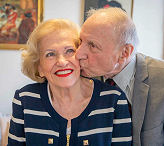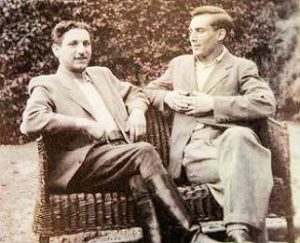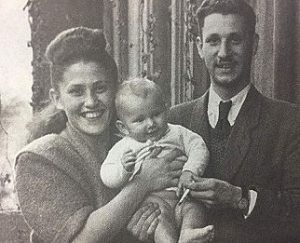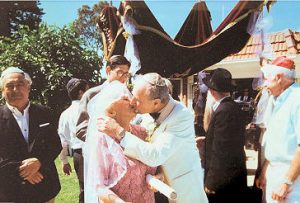Sigi z"l & Hanka Siegreich
- a love story: Częstochowa Holocaust survivors celebrating seven decades of marriage
 Melbourne Australia couple Sigi (93) and Hanka (91) say after all of these years they are still very much in love.
Melbourne Australia couple Sigi (93) and Hanka (91) say after all of these years they are still very much in love.
Having virtually grown up in labour camps, the teenagers were both wasting away when their eyes first locked in the Częstochowa camp in Poland.
“I lost my mind,” Sigi says. “When I saw her, the whole world was turning around me. I saw a pair of beautiful eyes and I heard bells ringing.”
It was New Year’s Eve 1944, eighteen days before the camp was liberated by the Red Army.
“I had no interest in girls, because I was a skeleton,” Sigi says. “There was a pair of beautiful eyes looking at me, with a smile like I never saw in my life.”
He approached her and they talked. Before returning to his barracks he gave her a kiss on the cheek.
“I remember the first kiss,” Hanka says as she puts her hand on her face. That is exactly what she did on that first day because, she says, she wanted to hold onto it forever. Sigi had stood out in an environment where the inhumane conditions had left most people shells of their former selves.
“At that time, the people in the camp were terrible,” she says. “He was very gentle.”
Over the coming days, this new love was tested. Sigi had been working in the munitions workshop making bullets for the Nazi German army. He says he had been sabotaging the factory line making bullets too small for the gun barrels. When he received word that the Gestapo were looking for him, he found a hiding spot in a nearby abandoned construction site. He says only Hanka knew where he was hiding.
“She was the only person I could trust my life with,” he says.
Hanka says she risked her life to keep him alive smuggling him small pieces of her bread ration and a blanket that she had made to keep him warm on -15 degree nights. Then one night, she came for a second visit. This time, she was smiling and had her arms out. The camp was being liberated.
“They’re gone,” she told him. “We are free.”
The next day they were married.
The year after, Hanka gave birth to the first of their two daughters, Evelyne, the first baby born to Holocaust survivors in Sigi’s home town of Katowice after the war.
 Sigi and friend Adam Frydman, a fellow camp inmate and witness to his marriage to Hanka.
Sigi and friend Adam Frydman, a fellow camp inmate and witness to his marriage to Hanka.
 Sigi and Hanka Siegreich with
Sigi and Hanka Siegreich with
their daughter Evelyne in 1946.
 Having moved to Australia in 1971, it wasn’t until their 50th wedding anniversary that the couple had a proper wedding, in their daughter’s Melbourne backyard.
Having moved to Australia in 1971, it wasn’t until their 50th wedding anniversary that the couple had a proper wedding, in their daughter’s Melbourne backyard.
Amazingly, their witnesses were fellow inmates at the labour camp, who had also witnessed their 1945 marriage signing.
“We’ve achieved a lot,” Sigi says. “We’ve got so many grandchildren and great grandchildren. She charmed me. That was that, the rest was history.”
Unlike Hanka and Sigi, only a handful of their classmates survived the Holocaust. Their great-grandson’s school, Bialik College, is currently collecting 1.5 million buttons to honour the children who were murdered under the Nazi regime. Sigi is donating 180 buttons to the project this month, to represent the family he lost in the Holocaust.
The doting couple, aged 93 and 91, have already had their gravestones prepared, side by side, for when they leave this world. The inscription also commemorates their immediate family who were never given a grave.
“We are inviting the souls of our exterminated family to rest in our grave.”
[Webmaster: Sadly, Sigi passed away, in Melbourne, on 18th October 2019, at the age of 95.]
Sources:
Story by Margaret Burin
Australian Broadcasting Commission
News 24 TV
and
Material reproduced here
with the kind permission of
Sigi and Hanka Siegreich
